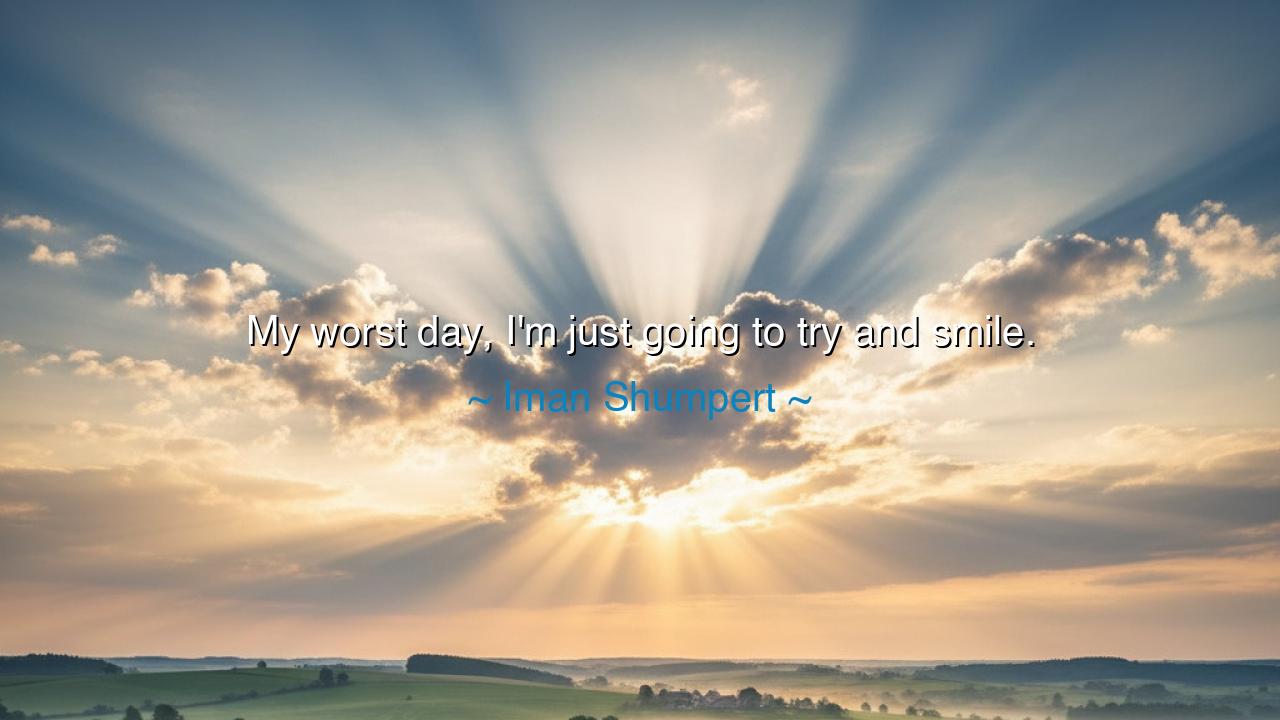
My worst day, I'm just going to try and smile.






Hear, O seeker, the words of Iman Shumpert, who once declared: “My worst day, I’m just going to try and smile.” At first, these words seem simple, the kind of phrase a man might toss into the wind. Yet, like a seed carried by the breeze, they contain the roots of deep wisdom. For here is a teaching as old as suffering itself: even in the darkest hour, one may choose the light of the heart, and in that choice lies strength greater than despair.
The meaning is this: every life will have its worst day. No man, no woman, no king nor pauper is spared. Illness strikes, failures wound, losses carve deep scars. In those moments, one could sink into bitterness, letting sorrow reign unchecked. But Shumpert counsels another way: to smile, not as denial of pain, but as defiance of it. The smile becomes a shield, a small but radiant act of courage that declares to suffering: you may press upon me, but you will not possess me.
The ancients too spoke of such defiance. Consider the Stoic philosopher Epictetus, born a slave, bound by chains, yet teaching that freedom lay not in circumstance but in the mastery of the self. When hardship came, he did not curse the heavens; instead, he bore it with composure, often even with quiet humor. His smile, like Shumpert’s, was not born of ease but of unyielding will. In this, we see the timeless lesson: the worst day cannot defeat the one who carries light within.
History gives us also the story of Nelson Mandela. In prison for 27 years, he endured cold walls and endless injustice. Yet those who saw him remembered his calm demeanor, his quiet dignity, and often his smile. That simple act became a weapon stronger than anger, for it told his captors that his spirit remained unbroken. Shumpert’s words echo the same truth: a smile on the worst day is not weakness, but the ultimate proof of resilience.
Yet there is nuance here. To smile is not to deny suffering, nor to bury pain beneath false cheer. It is to choose the higher path when the lower path beckons. It is to say: I acknowledge the storm, but I will not let it drown my fire. The smile is not a mask to hide despair, but a statement that hope still lives, even if only as a spark. And often, that spark—seen by others—becomes the light that helps them endure their own storms.
The lesson is clear: when your worst day arrives, and surely it will, do not give all your power to sorrow. Allow yourself to feel, yes, but also to rise, even if only with the smallest act of rebellion—a smile. For that small act declares that you still belong to yourself, that your spirit is not conquered. And from that act, strength grows, until the darkness is lessened and the dawn comes nearer.
Therefore, my children, take this into your daily walk: practice the art of choosing light even in shadow. When hardship comes, breathe deeply and find one thing—however small—for which to give thanks. Place a smile upon your face, not for the world alone, but for your own heart. For in that moment, you remind yourself that the storm will pass, but your spirit will remain. And one day, when you look back, you will know that even on your worst day, you still carried a flame.






AAdministratorAdministrator
Welcome, honored guests. Please leave a comment, we will respond soon